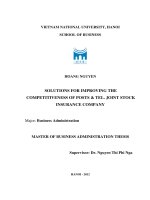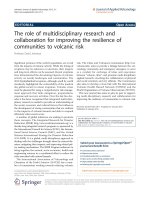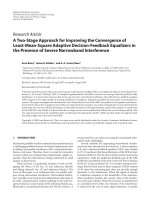Effect of holding solutions on Dendrobium Orchids cv. Sonia 17 for improving the vase life of cut spikes
Bạn đang xem bản rút gọn của tài liệu. Xem và tải ngay bản đầy đủ của tài liệu tại đây (138.67 KB, 4 trang )
Int.J.Curr.Microbiol.App.Sci (2019) 8(1): 224-227
International Journal of Current Microbiology and Applied Sciences
ISSN: 2319-7706 Volume 8 Number 01 (2019)
Journal homepage:
Original Research Article
/>
Effect of Holding Solutions on Dendrobium Orchids cv. Sonia 17 for
Improving the Vase Life of Cut Spikes
M. Sanghamitra*, J. Dilip Babu, B.V.K. Bhagavan and D.R. Salomi Suneetha
Department of Floriculture and Landscaping, College of Horticulture, Dr. YSR Horticultural
University, Venkataramannagudem, Tadepalligudem, West Godavari district,
Andhra Pradesh, India
*Corresponding author
ABSTRACT
Keywords
Dendrobium,
Holding solutions,
Vase life, Post
harvest parameters
Article Info
Accepted:
04 December 2018
Available Online:
10 January 2019
Effect of holding solutions on Dendrobium orchids cv. Sonia 17 for
improving vase life of cut spikes was studied. In the trail using
holding solutions, 8HQC (300 ppm) + 4% sucrose was best in
achieving all parameters like Vase life (31.50), Physiological loss of
weight (36.39%), Days for fading of first flower (18.14), Days for
fading of last flower (52.38), Percent bud opening per spike (86.06%)
and number of unopened and abscised buds per spike(13.88%) on
Dendrobium cut spikes cv. Sonia 17 when compared to control.
Introduction
Orchids are commercially grown worldwide
as cut flower and have much demand both in
domestic
and
international
markets.
Dendrobium, one of the largest genera of the
family Orchidaceae, is a popular tropical
Orchid, grown commercially as cut flower. In
the present cut flower industry, Dendrobium
cv. Sonia 17 has taken a prominent place due
to colour, attractiveness and long season of
bloom. The most important barriers in the
marketing and commercialization of many cut
flowers are their short vase life and their
inability to withstand stresses during storage
or transit (Zamani et al., 2011). Correct stage
of harvesting is essential as it not only
influence keeping quality, but also adds to the
beauty of the spike. Vase life of Dendrobiums
has been much influenced by ethylene
production and respiration which are the major
physiological processes that are responsible
for deterioration and short life. In cut flower
industry about 10-30 % losses occur due to
postharvest
damage
and
mishandling
practices. Further, it could be possible to
extend the postharvest life of flowers by using
different preservative solutions. Appropriate
224
Int.J.Curr.Microbiol.App.Sci (2019) 8(1): 224-227
postharvest management of any cut flower is
of utmost important to ensure the long lasting
quality. Keeping all these considerations in
view an experiment was taken up to in order
to improve the vase life of cut spikes.
Materials and Methods
The cut flowers of Dendrobium Orchids cv.
Sonia 17, employed for the studies were
procured from the centre of excellence,
Chintapalli (Visakhapatnam district). The
flowers are harvested at commercial stage of
harvest (2-3 unopened buds per spike) for the
experiment. Immediately after harvesting, the
flowers were pre-cooled by dipping the basal
portions of the cut flowers in a bucket
containing water, then the stem is plugged
with cotton containing water and brought
immediately to the laboratory for imposing the
treatments. Completely randomized design
was set with three replications having five
spikes in each replication. Postharvest
observations including Vase life, Days for
fading of first flower, Days for fading of last
flower, Percent bud opening per spike (%),
No. of unopened and abscised buds per spike
(%), Physiological loss of weight (%) were
recorded.
Results and Discussion
The data pertaining to the effect of holding
solutions on physiological loss of weight,
Vase life and Days for fading of first flower of
Dendrobium orchids cv. Sonia 17” is
presented in Table 1. The data for
physiological loss of weight was recorded on
initial day and at final day. Significant
differences were observed in physiological
loss of weight among different treatments.
Among all the treatments, significantly the
minimum physiological loss of weight was
observed in cut spikes held in vase solution
containing 8HQC (300 ppm) + 4% sucrose
(T2) (36.39) and the maximum physiological
loss of weight was observed in control (T7)
(59.40). The data for vase life was recorded
from the time of keeping the flowers in vase
until the first sign of wilting or fading to the
death of the 50% flower petals. Significant
differences were observed in vase life among
different treatments. Among all the treatments,
significantly the maximum vase life was
observed in cut spikes held in vase solution
containing 8HQC (300 ppm) + 4% sucrose
(T2) (31.50) and the minimum vase life was
observed in control (T7) (15.62).
The data for number of days taken for fading
of first flower was counted and recorded.
Significant differences were observed in days
for fading of first flower among different
treatments. Among all the treatments,
significantly the maximum days taken for
fading of first flower was observed in cut
spikes held in vase solution containing 8HQC
(300 ppm) + 4% sucrose (T2) (18.14) and the
minimum days for fading of first flower was
observed in control (T7) (10.35).
The data pertaining to the effect of holding
solutions on days for fading of last flower,
percent bud opening per spike, no. of
unopened and abscised buds per spike of
Dendrobium orchids cv. Sonia 17 is presented
in Table 2. The number of days taken for
fading of last flower was counted and
recorded. Significant differences were
observed in days for fading of last flower
among different treatments. Among all the
treatments, significantly the maximum days
taken for fading of last flower was observed in
cut spikes held in vase solution containing
8HQC (300 ppm) + 4% sucrose (T2) (52.38)
and the minimum days for fading of last
flower was observed in control (T7) (35.58).
The data for percentage of bud opening per
spike was calculated and recorded. Significant
differences were observed in percent bud
opening per spike among different treatments.
Among all the treatments, significantly the
225
Int.J.Curr.Microbiol.App.Sci (2019) 8(1): 224-227
maximum percent bud opening per spike was
observed in cut spikes held in vase solution
containing 8HQC (300 ppm) + 4% sucrose
(T2) (86.06) which is on par with Citric acid
(400 ppm) + 4% sucrose (T6) and the
minimum percent bud opening per spike was
observed in control (T7) (78.44). The data for
number of unopened and abscised buds per
spike was calculated and recorded. Significant
differences were observed in number of
unopened and abscised buds among different
treatments. Among all the treatments,
significantly the minimum number of
unopened and abscised buds per spike was
observed in cut spikes held in vase solution
containing 8HQC (300 ppm) + 4% sucrose
(T2) (13.88) and the maximum number of
unopened and abscised buds was observed in
control (T7) (21.55).
Table.1 Effect of holding solutions on Postharvest parameters of Dendrobium orchids cv. Sonia 17
Treatments
Physiological
loss of weight
(%)
Vase life (days)
Days for fading
of first flower
(days)
T1: 8HQC (200 ppm) + 2% sucrose
41.22
29.38
16.20
T2:
T3:
T4:
T5:
T6:
36.39
55.38
51.80
45.37
42.92
31.50
25.07
28.48
26.43
29.80
18.14
12.12
12.59
14.68
15.55
59.40
47.49
0.50
1.47
15.62
26.55
0.53
1.59
10.35
14.23
0.49
1.55
8HQC (300 ppm) + 4% sucrose
AgNO3 (30 ppm) + 2% sucrose
AgNO3 (40 ppm) + 4% sucrose
Citric acid (300 ppm) + 2% sucrose
Citric acid (400 ppm) + 4% sucrose
T7: Control
Mean
SEm±
CD at 5%
Table.2 Effect of holding solutions on post harvest parameters of Dendrobium orchids cv. Sonia 17
Treatments
Days for fading
of last flower
(days)
Percent bud
opening per
spike (%)
No. of unopened
and abscised
buds per spike
(%)
T1: 8HQC (200 ppm) + 2% sucrose
49.88
84.15
16.00
T2:
T3:
T4:
T5:
T6:
52.38
39.85
42.70
44.58
46.62
86.06
80.12
82.37
83.84
85.18
13.88
20.02
18.15
16.12
15.13
35.58
44.51
0.50
1.58
78.44
82.88
0.40
1.28
21.55
17.26
0.21
0.67
8HQC (300 ppm) + 4% sucrose
AgNO3 (30 ppm) + 2% sucrose
AgNO3 (40 ppm) + 4% sucrose
Citric acid (300 ppm) + 2% sucrose
Citric acid (400 ppm) + 4% sucrose
T7: Control
Mean
SEm±
CD at 5%
226
Int.J.Curr.Microbiol.App.Sci (2019) 8(1): 224-227
From the above results it might be concluded
that holding solution of 8HQC (300 ppm) + 4%
sucrose was best regarding all the postharvest
parameters. Holding solutions must essentially
contain two components sugar and germicides.
The sugars provide a respiratory substrate while
the germicides control harmful bacteria and
prevent plugging of the conducting tissue.
all parameters when compared to 8HQC (200
ppm) + 2% sucrose. However increased
concentration of 8HQC decreased the microbial
growth and enhanced the vase life of cut spikes.
References
Abhimanyu chaturvedi, Anjana, N. Tripathi and
Chaturvedi, S.K. 2016. Effect of plant
growth regulators and floral preservatives
on plant growth, spike yield and vase life of
Dendrobium Orchid hybrid Sonia 17.
Progressive Horticulture. 48(1).
Ajithkumar, K, Rajeevan, P.K, Sobhana, A,
Sudhadevi, P.K, Sarada, S. and Simi, S.
2013. Effect of pulsing and holding
solutions on vase life of Dendrobium cv.
Sonia 17. Asian Journal of Horticulture.
8(2): 726-28.
Akhila Devi, R. and Jawaharlal, M. 2005. Effect
of holding solution on post harvest life of
cut flowers in anthurium (Anthurium
andreanum Lind.) cv.Temptation. Journal
of Ornamental Horticulture. 8(4): 318-19.
Jomy, T.G. 1998. Enhancement of post harvest
life of Dendrobium flower. M.Sc. Thesis,
Kerala Agricultural University, Thrissur,
Kerela.
Miano, T.F, Rabbani, M.G. and Mondal, M.F.
2015. Vase life of Dendrobium Sonia under
various holding solutions and packing
materials. Science International. 27(5):
4337-4340.
Yogesh Auty, Alka Singh and Gaurang Patel.
2015. Optimization of harvest stage and
improvement in the post harvest life of
Orchid (Dendrobium) cut spikes with vase
solution treatments. Bioinfolet. 12(4A):
823-27.
Zamini, S, Kazemi, M. and Aran, M. 2011.Post
harvest life of cut rose flowers as affected
by salicylic acid and glutamine. Journal of
World Application Sciences. 12:1621-24.
8 HQC along with combination of sucrose
increased the fresh weight of the spike. Fresh
weight retention is dependent on maintenance
of carbohydrate level and water uptake.
Presence of 8HQC in the treatments increased
the water uptake, which might be due the
physical and biological changes of the stem.
This gives an idea about reduction in stem cell
conductivity and water transportation among
orchids that induced stem occlusions rather than
occlusions of microbial origin. Increase in fresh
weight and water uptake ultimately increased
the vase life of spike when kept in vase solution
containing 8HQC and Sucrose might be due
reduced rate of senescence which improved
vase life by maintaining respiration rate and cell
membrane integrity. Jomy (1998) reported that
the use of a combination of 4% sucrose and 400
ppm 8 HQ enhanced the vase life of Dedrobium
flowers.
8HQC along with sucrose increased the days for
fading of first flower, the days for fading of last
flower, percent bud opening per spikes and
reduced the number of unopened and abscised
buds per spike might be due to high water
uptake, remained flowers fresh and prevented
early wilting and high carbohydrates in petal
tissues enhanced bud opening and reduced
unopened buds per spike.
In conclusion, the vase solution having 8HQC
(300 ppm) + 4% sucrose was best in achieving
How to cite this article:
Sanghamitra, M., J. Dilip Babu, B.V.K. Bhagavan and Salomi Suneetha, D.R. 2019. Effect of Holding
Solutions on Dendrobium Orchids cv. Sonia 17 for Improving the Vase Life of Cut Spikes.
Int.J.Curr.Microbiol.App.Sci. 8(01): 224-227. doi: />
227









